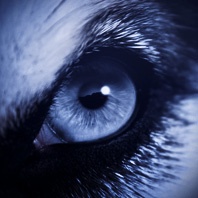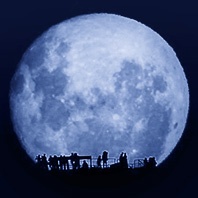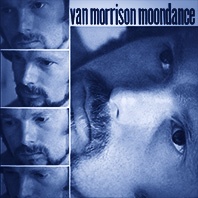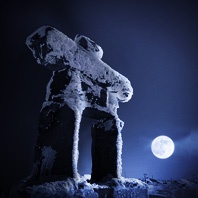Sir Charles Spencer Chaplin (1889–1977) is considered one of the first movie stars ever and made film history with his acting and his works. He is also one of the few artists who managed the transition from silent films to sound films.
Because of using archetypal imagery and symbols in his films, it is natural that the moon could also play a part somewhere. We found four references:
Read more
Again and again it is spoken about the Moon in the night sky, and the visible size for us here from Earth and we would like to recall some details or outline and summarize them again:
The Sun and the Moon about the same size in the sky
The full moon in the sky appears to have almost the same size as the Sun by day, because the Sun is approx. 400 times as large as the Moon, but also 400 times further away. So it balances itself out and this is how these two very different sized orbs appear to be of the same magnitude to us.
Read more
When examining it thoroughly, we humans will never be able to touch the Moon directly, because even when an astronaut is standing on its surface, there is always the glove of the spacesuit in between, without which, life could not exist on foreign celestial bodies (consider also Mars).
There are a variety of dangers that the spacesuit protects the wearer from: vacuum, cold and heat, weightlessness, micrometeorites and radiation. Hereby, a distinction is made between suits that are only worn inside the space capsule during specific maneuvers, and suits that are used for space walks and actually leave the spacecraft.
Read more
When looking at the Moon, how slowly it travels across the night sky, one could easily forget that we are moving with a staggering speed through space with our Earth and our Moon. Furthermore, there is the rotation of the orbs to each other, which remains hidden from our senses as well. Only the mind knows of these astronomic connections and only for a short period of time (measured by our existence).
Read more
We have compared the amount of visitors from our full moon pages with the curve of an electrocardiogram (ECG) and came across an astonishing similarity. It almost appears as if the attention that we humans give to full moon would have its own heartbeat …
It is obvious that the interest in full moon can be linked to its rhythm. The average duration of a moon month is approx. 29.5 days, so a little bit more than four weeks and a little bit less than one calendar month. One can safely say, a lot of people are paying attention to the moon at full moon and clearly a lot less so during the other moon phases.
Read more
 We are approaching a more sinister subject, the werewolf, a being that apparently changes from human into a wolf on the full moon. Everyone has heard about it or seen more or less plausible interpretations in movies. Where does this belief stem from? Why a wolf of all animals? And why in the full moon light?
We are approaching a more sinister subject, the werewolf, a being that apparently changes from human into a wolf on the full moon. Everyone has heard about it or seen more or less plausible interpretations in movies. Where does this belief stem from? Why a wolf of all animals? And why in the full moon light?
The word »werewolf« contains, without difficulty to recognise, the »wolf« and the word »were« that translates into »man, human« and can be found in many languages, et al. Old Enlish, Germanic, Old High German and more. So we are talking about a man wolf or a wolfman, someone who can or must take the shape of a wolf. This belief has been widespread in the old days and this had nothing to do with the cliché we are getting to see in horror movies today.
Read more
“Full Moon Silhouettes” is an almost 4 minute real time video by the Australian photographer and visual effect artist Mark Gee, where the rise of the full moon is shown, above Mount Victoria lookout in Wellington (New Zealand). You can see an uncut sequence where the Moon rises from the lower right corner above the horizon, and ascends to the left upper side (because this takes place on the southern hemisphere!). The visitors on the lookout are visible as black silhouettes in front of the yellow Moon and its luna maria.
Read more
It is time again to write about a song on the theme of the Moon: »Moondance« by Van Morrison. Released in February of 1970, on the album with the same title, by the musician from Northern Ireland, belongs to the classics amongst the moon songs. It hovers stylistically between rhythm & blues and country rock, but also jazz influences can be recognized. »Moondance« was placed in the English and American Charts. It was never a smash hit, but still today belongs to the concert repertoire of ›Van the Man‹ and can be heard time and again on the radio.
Read more
When taking a look at the Inuit [*] in the far north, you will find astonishing myths about the full moon. The Inuit live along the Arctic Ocean from the north east of Russia to Greenland and Canada, where coldness reigns. The culture is imprinted by an archaic consciousness, life is interwoven with legends that were never written down, due to harsh living conditions, but only passed down by word of mouth.
Read more
Just like with all natives from different countries and continents, the Moon also plays an important role amongst African peoples in myths and stories. In this respect, we have already mentioned other peoples, for example the Native American Indians in America, the Inuit in the far north or the Aborigines in Australia.
Read more
Today, we would like to focus on a more culinary subject of everything that can be eaten or drunk and is prepared in connection with the full moon. Apparently, there is a multitude of vendors (especially in Switzerland), who regularly manufacture their products at the full moon and who detect that the quality of their foods differs from the foods, which have not been produced in connection with any lunar happenings. These products appear to sell accordingly and successfully. We have not been able to fathom out whether this is really related to the Moon – it might also be that the consciousness of the acting persons is different, or that the customers bring along the appropriate willingness to appreciate the reference to the full moon.
Read more





 We are approaching a more sinister subject, the werewolf, a being that apparently changes from human into a wolf on the full moon. Everyone has heard about it or seen more or less plausible interpretations in movies. Where does this belief stem from? Why a wolf of all animals? And why in the full moon light?
We are approaching a more sinister subject, the werewolf, a being that apparently changes from human into a wolf on the full moon. Everyone has heard about it or seen more or less plausible interpretations in movies. Where does this belief stem from? Why a wolf of all animals? And why in the full moon light?



